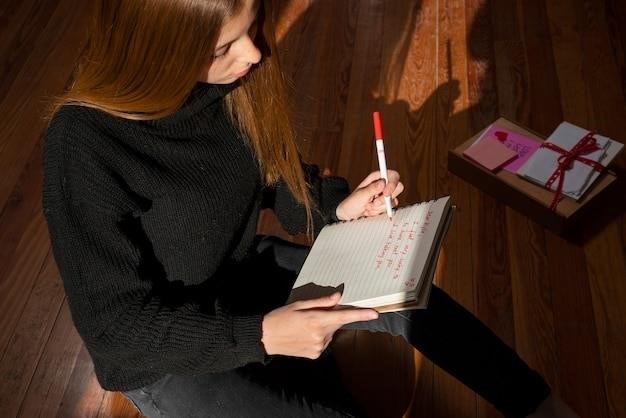
Romeo and Juliet Act II⁚ A Study Guide
Act II of Romeo and Juliet significantly advances the plot, showcasing the burgeoning romance between Romeo and Juliet amidst the backdrop of their families’ bitter feud. Their secret marriage, facilitated by Friar Laurence, intensifies the central conflict, while Tybalt’s challenge foreshadows further tragedy.
Act II, Scene 2⁚ The Balcony Scene
Act II, Scene 2, famously known as the balcony scene, is a pivotal moment in Romeo and Juliet’s burgeoning romance. Juliet, unaware of Romeo’s presence, confesses her love for him, expressing her anxieties about their families’ feud. Romeo’s passionate declarations mirror Juliet’s sentiments, solidifying their commitment to one another. Shakespeare masterfully employs poetic language and vivid imagery to convey the intensity of their love. The scene’s romanticism is juxtaposed with the underlying awareness of the dangers their forbidden love entails, highlighting the play’s central themes of love, passion, and fate. Romeo’s impulsive decision to jump the wall and his clandestine meeting with Juliet underscores the rashness and intensity of their relationship. The scene’s dramatic tension culminates in their mutual pledge of love and their agreement to marry, accelerating the plot towards inevitable conflict. The balcony scene’s poetic beauty and dramatic power remain iconic in literature and theatrical performances.
Analysis of Romeo and Juliet’s Declarations of Love
Romeo and Juliet’s declarations of love in Act II are characterized by intense passion and poetic expression. Romeo, initially captivated by Juliet’s beauty, uses vibrant metaphors, comparing her to the sun and stars, elevating her to a celestial being. His language is overflowing with hyperbole, reflecting the overwhelming nature of his newfound love. Juliet, equally smitten, reciprocates his affection with heartfelt honesty and vulnerability. She expresses anxieties about their families’ hatred, revealing a maturity beyond her years. Their exchanges are filled with vivid imagery and sensual language, emphasizing the physical and emotional intensity of their connection. The rapid escalation of their relationship highlights the impulsive and all-consuming nature of their love. However, their passionate pronouncements also foreshadow the tragic consequences of their defiance against societal norms and familial expectations. The power of their declarations lies in their raw emotionality and the stark contrast between their passionate love and the hostile world surrounding them.
The Significance of Poetic Language and Imagery
Shakespeare masterfully employs poetic language and rich imagery throughout Act II to amplify the intensity of Romeo and Juliet’s love and the dramatic tension of their situation. Romeo’s comparisons of Juliet to celestial bodies—”the sun,” “the stars”—elevate her to an almost divine status, highlighting the transformative power of their love. Juliet’s equally passionate responses, using metaphors of light and darkness, further emphasize the depth of their connection. The use of sonnets and other poetic forms underscores the play’s romantic nature, contrasting sharply with the harsh reality of the feud. The imagery of light and darkness, frequently employed, symbolizes both the brightness of their love and the ominous shadows cast by their families’ conflict. This juxtaposition enhances the dramatic irony, as the audience is aware of the impending tragedy despite the lovers’ blissful ignorance. Shakespeare’s skillful use of language and imagery not only creates a captivating reading experience but also underscores the play’s central themes of love, fate, and the destructive power of hatred.
Key Events and Plot Developments in Act II
Act II centers on Romeo and Juliet’s secret marriage, orchestrated by Friar Laurence, intensifying the conflict with the Capulets and Montagues, and foreshadowing future tragedy.
Romeo and Juliet’s Secret Marriage
The clandestine union of Romeo and Juliet in Act II forms a pivotal plot development, dramatically escalating the conflict between the Montague and Capulet families. Their impulsive decision, fueled by passionate love, directly contradicts the deeply ingrained hatred between their families. This secret marriage, performed by Friar Laurence, represents a desperate attempt to reconcile their love with the societal constraints imposed upon them. The secrecy surrounding the marriage adds to the dramatic tension, knowing that the revelation of their union would likely result in severe consequences for both Romeo and Juliet. The Friar’s involvement suggests a degree of hope for resolution, or at least a temporary reprieve from the escalating feud, but also highlights the potentially tragic consequences if their secret is discovered.
The Friar’s Role in the Marriage
Friar Laurence’s participation in Romeo and Juliet’s secret marriage is a complex and pivotal aspect of Act II. His decision to marry the young lovers stems from a mixture of motives. He might hope to reconcile the feuding families through this union, believing that their love could potentially heal the deep-seated hatred. However, his actions also reveal a degree of naiveté or perhaps even a willingness to take a risk, believing in the power of love to overcome seemingly insurmountable obstacles. The Friar’s role is crucial in setting the stage for the tragic events that follow, as his actions, while seemingly well-intentioned, ultimately contribute to the escalating conflict and the devastating consequences. His involvement underscores the theme of fate versus free will, highlighting how even the best-laid plans can be undone by unforeseen circumstances.
Tybalt’s Challenge and the Growing Conflict
Tybalt’s discovery of Romeo’s presence at the Capulet feast ignites a critical turning point in Act II, escalating the existing conflict. His immediate and fiery challenge to Romeo, despite Romeo’s attempts at peace, underscores Tybalt’s unwavering loyalty to his family and his volatile nature. This confrontation, though seemingly a minor incident, serves as a potent catalyst, highlighting the precariousness of Romeo and Juliet’s burgeoning love amidst the deep-seated hatred between their families. The unresolved tension created by Tybalt’s challenge foreshadows the inevitable clash between the Montagues and Capulets, ultimately driving the plot towards its tragic climax. The looming threat of violence intensifies the dramatic stakes and underscores the play’s exploration of fate and the destructive power of family feuds.

Themes Explored in Act II
Act II deeply explores the complexities of forbidden love, juxtaposing passionate romance against the destructive force of family conflict and the unpredictable nature of fate.
Love and Passion vs. Family Feud
Act II of Romeo and Juliet vividly portrays the intense conflict between the passionate love shared by Romeo and Juliet and the deeply rooted hatred between their families, the Montagues and Capulets. Their burgeoning romance is a stark contrast to the generations-long feud that threatens to consume them. Shakespeare masterfully uses the balcony scene to highlight the overpowering nature of their love, a force seemingly capable of overcoming even the most entrenched societal divisions. However, the very intensity of their feelings makes their situation all the more precarious, as their secret relationship is a direct defiance of their families’ wishes and traditions. This central conflict drives the plot forward, highlighting the destructive power of prejudice and the strength of love in the face of adversity. The play emphasizes how deeply ingrained these familial rivalries are, making Romeo and Juliet’s love not just a personal challenge, but a direct rebellion against the established order.
The Power of Fate and Destiny
Act II of Romeo and Juliet heavily emphasizes the inescapable feeling of fate and destiny shaping the lovers’ lives. From the prologue’s foreshadowing of a tragic end, despite their burgeoning love, to the numerous chance encounters and coincidences that bring Romeo and Juliet together, the play suggests their relationship is predetermined. The swiftness of their falling in love, coupled with the immediate obstacles presented by the family feud, points towards a preordained path, regardless of their choices. Even the Friar’s involvement in their secret marriage can be interpreted as a sign of fate guiding their actions, albeit potentially towards a disastrous conclusion. This sense of inevitability adds to the dramatic tension, as the audience is aware of the potential consequences, even as Romeo and Juliet are blinded by passion and hope. The play subtly questions whether their love is truly powerful enough to overcome the forces of fate that seem determined to pull them apart.
The Complications of Forbidden Love
Act II vividly portrays the complexities inherent in Romeo and Juliet’s forbidden love. Their passionate connection is immediately threatened by the deep-seated hatred between their families, the Montagues and Capulets. This feud creates a constant undercurrent of danger and secrecy, forcing the lovers to meet in clandestine locations and constantly fear discovery. Their relationship is not simply a romantic pursuit; it becomes a rebellion against the established social order and parental authority. The intense secrecy and the ever-present risk of exposure add layers of excitement and tension to their romance, but also highlight the precariousness of their situation. The forbidden nature of their love amplifies the stakes, making their eventual tragic fate seem almost inevitable, a consequence of defying societal norms and family expectations. Their passionate declarations are juxtaposed against the looming threat of violence and separation, showcasing the intense emotional toll of their forbidden love.
Character Analysis in Act II
Act II offers crucial insights into Romeo, Juliet, and Friar Laurence. Their actions and choices reveal their evolving personalities and motivations within the context of their forbidden love and the escalating family conflict.
Romeo’s Transformation and Emotional Depth
Act II profoundly reveals Romeo’s emotional depth and transformation. His infatuation with Rosaline is eclipsed by an intense, all-consuming love for Juliet. This passionate love is evident in his eloquent declarations, filled with vibrant imagery and metaphors. He compares Juliet to the sun, surpassing even the moon’s brilliance. His willingness to defy his family and societal norms for Juliet underscores his commitment and the transformative power of his love. The balcony scene especially showcases Romeo’s emotional vulnerability and the depth of his feelings as he openly expresses his devotion and desire to be with Juliet, regardless of the consequences. This act reveals a Romeo who is more mature, courageous, and willing to take risks for love, a stark contrast to the lovesick Romeo of Act I. His transformation is complete, marking a shift from superficial infatuation to a profound, life-altering love.
Juliet’s Courage and Determination
Juliet, in Act II, displays remarkable courage and determination in the face of seemingly insurmountable obstacles. Despite the inherent risks and the deep-seated feud between her family and Romeo’s, she boldly declares her love, defying societal expectations and familial constraints. Her passionate pronouncements on the balcony, where she openly confesses her feelings, showcase her unwavering commitment to Romeo. Juliet’s determination is further exemplified by her willingness to proceed with the secret marriage, fully aware of the potential consequences. This decision demonstrates her proactive approach to pursuing her love and her resolute defiance of the societal norms that would keep them apart. Her courage stems from the strength of her love and her conviction that their relationship transcends the limitations imposed by their families’ hatred. This act reveals Juliet as a strong-willed and independent young woman.
Friar Laurence’s Moral Ambiguity
Friar Laurence’s role in Act II introduces a layer of moral ambiguity to the narrative. While seemingly benevolent in facilitating Romeo and Juliet’s secret marriage, his motivations remain somewhat unclear. Is he driven by genuine compassion for the young lovers, hoping to reconcile the feuding families through their union? Or does a more pragmatic or even manipulative element influence his actions? His decision to marry them secretly, knowing the potential risks and consequences, raises questions about his judgment and the potential repercussions of his actions. The Friar’s somewhat clandestine involvement casts a shadow of doubt on his intentions, leaving the audience to ponder whether his actions are ultimately beneficial or detrimental to the lovers’ fate. His actions, though seemingly well-intentioned, contribute to the escalating conflict, making his role morally complex and open to interpretation.


